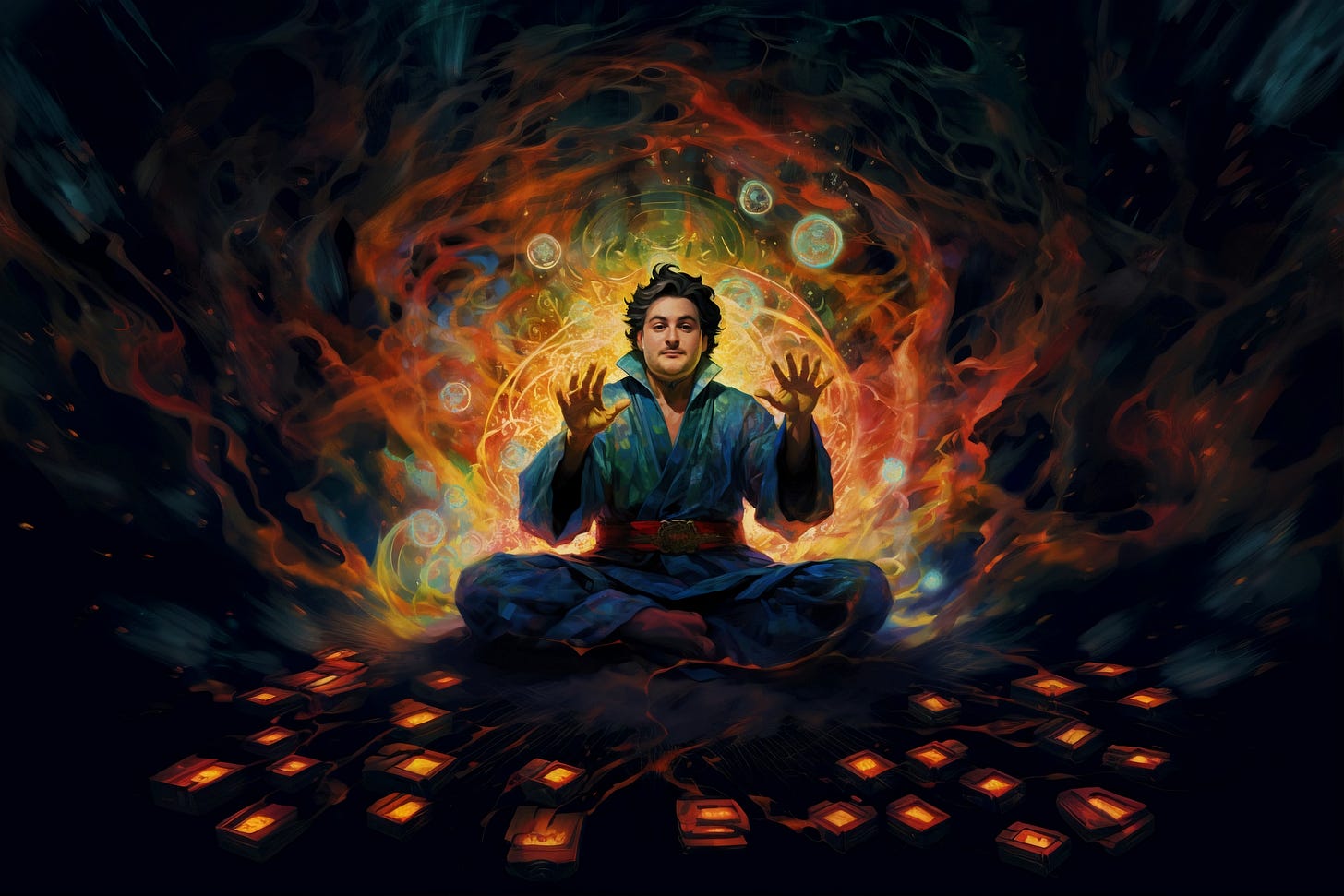So much of what we consider enduring is a fleeting illusion, a glittering but illusory palace conjured from time's shifting sands. All is flux, transition, and flow. Within each moment lies the seed of perpetual change. We begrudgingly tolerate mortality's background buzz as if it were a painfully inescapable pop-up advertisement. But the truth is that even dreams of a legacy return to the churning tide of being. Our outstanding achievements are forgotten. Man's most impressive monuments invariably fade to dust.
Modernity amplifies the effects of impermanence. Consumerism breeds an insatiable lust for the next shiny thing whilst ruthlessly displacing the tired and old. Urbanization engulfs communities in anonymity, eroding cohesion and shared values. Social media's torrent of trivialities disarms gravitas. Technology's rapid evolution accelerates this cycle from novelty to obsolescence. Indeed, it's difficult not to envision Silicon Valley still haunted by Steve Jobs' taunting spectre. Always rushing headlong into the future, we lose touch with the before.
Furthermore, the prevailing liberal ideal of living as "a citizen of the world" leaves us culturally homeless. In pursuing abstract global citizenship, we relinquish all roots. Our cosmopolitan hyper-tolerance breeds indifference to anything specific. Man has become a perpetual tourist in his own life, no longer anchored to place, customs, or community. When nothing endures, what symbols, achievements, or legacies can persist?
As a festival, Succos famously brings the theme of impermanence into focus. The Talmud teaches that the Succah must be a temporary structure, not a permanent edifice. This guideline is commonly understood as a reminder of our temporality. Dwelling in detachment from the concrete, we can't help but reflect on how fleeting this world and life in it can be.
Fascinatingly, the mystical sources associate Succos with our forefather Yakov. They establish this association via the verse:
... Yakov journeyed to Succos, built a house for himself and made stalls for his cattle; hence, the place was called Succos.
{Bereishis 33:17}
In truth, the pairing feels intuitive. Both the narrative and traits associated with Yakov share the main theme of Succos: transience. Yakov's lifetime was punctuated with shifts and transitions. He is considered the only patriarch to have 'gone into exile'. His grandfather, Avraham and father, Yitzchak, were each marked by a fully developed spiritual trait1. On the other hand, although Yakov preserves his forbears' achievements, he displays no distinct characteristic of his own.2
And yet, though draped in the outward garments of fleeting change, Yakov harbours an enduring substance beyond his forebears. Behind a veil of flux, he conceals an immovable essence. Our sages teach us that Yakov's image is carved into God's throne. While this declaration conveys mystical significance beyond our purview, it undeniably indicates a nature of transcendent permanence.
Furthermore, Yakov is the steadfast foundation upon which God built the entire Jewish nation. Unlike his predecessors, he produced only righteous children, and through his second name, Yisrael, our people obtained their eternal designation. When descent to Egypt becomes inevitable, the first step in our many exiles, it is Yakov who directs the establishment of houses of study, foreseeing they alone can sustain faith across millennia. Even as the Jewish people's circumstances varied from land to land, exile to exile, centres of scholarship preserved Israel's identity, hope and bond with God.
Rav Yitzchak Hutner understands that Yakov's paradox unveils deeper insight into twinning the festival of Succos. Yakov, he explains, had no trait of his own precisely because he reflected God's image most fully. Within God, all attributes find their fulfilment not in isolation but subsumed in an astounding unity. Genuine eternity can never be captured in particulars, however appealing such robust categories may seem. Nothing too rigidly defined can withstand the strains of varying situations. Like a kaleidoscope that produces limitless arrangements from fixed fragments, Yakov's permutations express a fundamental core.

Succos recalls the Clouds of Glory God enveloped the Jewish people with as they travelled through the desert to the Land of Israel. It thus embodies the concept of God's eternal protection of the Jewish people. If so, just like Yakov, Succos must possess an everlasting quality - not a superficial veneer of longevity, but a deep and lasting infinitude. The Succah, as a short-term dwelling, evokes impermanence. Yet undergirding its exterior is a lasting stability, similar to how Yakov's shifting circumstances and traits concealed an unchanging divine core.
A seeming incoherence in the halacha encapsulates the metaphysical foundation of the Succah. As discussed earlier, our sages deemed the Succah a temporary structure, not a permanent edifice. And yet there is a separate instruction that we must live within our Succah according to how we inhabit our homes. In other words, we must reside in a temporary environment but maintain an attitude of permanence, sort of like Donald Trump's attitude towards the presidency.
It is noteworthy that in much the same way, we see the Jewish people lacking all superficial signifiers of permanence. Heinrich von Treitschke, an anti-Semitic German historian, published an article in 1879 where he wrote, "The Jews do not fit into the mould of a nation that should survive because they lack the most essential requirement of a nation, a national character."3 Yet, despite Heinrich's vociferous protestation, the nation has withstood the test of time better than any other. A fact more magnanimously acknowledged by the likes of Mark Twain4, Leo Tolstoy5 and Winston Churchill.6
Something in the human spirit seeks permanence, stability, and legacy. We cling to people, places, and achievements to ground us in an ever-changing world. And look, that's not all too shabby. Few of us will ever achieve the level of Zen required to remain chilled out and mentally stable whilst floating in an interminable transient abyss.

Yet it's tough to ignore that the more we grasp, the more elusive eternity feels. That intoxicating mirage of stability slips further into the haze. Always in constant pursuit, we are left wrung out like linen hanging in a hurricane - tossing and twisting with our ideal condition just out of reach.
Perhaps this is the Succah's whispered wisdom - its walls may not be rock solid, but they still stand, however precariously. What we build in this world is fleeting, but it connects us to a current of continuity flowing silently beneath the surface. We need not cling to transient things. It is enough to open ourselves to what they signify. Worldly impermanence points to an unseen eternity beyond like a turbulent river rushing over hidden depths. We may never hold it, but by relaxing our grip on the tangible, we can float upon its endless waters. Starfishing on the surface, we sense ourselves cradled by vaster meaning. In the Succah, we find not worldly solidity but an eternal connection rooted in the Divine.
Keep Pondering, and Have A Wonderful Succos!
If you enjoyed reading this, feel free to click the ❤️ button on this post so more people can discover it on Substack 🙏
Avraham’s trait being חסד, Kindness, and Yitzchak’s גבורה, Strength/Control
Although we say that Yakov represented אמת, Truth, this is not considered to be an individual trait. Rather, truth is seen to be the appropriate combination of all other traits.
“If the statistics are right, the Jews constitute but one percent of the human race. It suggests a nebulous dim puff of star dust lost in the blaze of the Milky Way. Properly, the Jew ought hardly to be heard of, but he is heard of, has always been heard of. He is as prominent on the planet as any other people, and his commercial importance is extravagantly out of proportion to the smallness of his bulk. His contributions to the world’s list of great names in literature, science, art, music, finance, medicine, and abstruse learning are also away out of proportion to the weakness of his numbers. He has made a marvellous fight in this world, in all the ages; and has done it with his hands tied behind him. He could be vain of himself, and be excused for it. The Egyptian, the Babylonian, and the Persian rose, filled the planet with sound and splendor, then faded to dream-stuff and passed away; the Greek and the Roman followed, and made a vast noise, and they are gone; other peoples have sprung up and held their torch high for a time, but it burned out, and they sit in twilight now, or have vanished. The Jew saw them all, beat them all, and is now what he always was, exhibiting no decadence, no infirmities of age, no weakening of his parts, no slowing of his energies, no dulling of his alert and aggressive mind. All things are mortal but the Jew; all other forces pass, but he remains. What is the secret of his immortality?”
“The Jew is the emblem of eternity. He whom neither slaughter nor torture of thousands of years could destroy, he whom neither fire nor sword nor inquisition was able to wipe off the face of the earth, he who was the first to produce the oracles of God, he who has been for so long the guardian of prophecy, and who has transmitted it to the rest of the world – such a nation cannot be destroyed. The Jew is as everlasting as eternity itself.”
“Some people like the Jews, and some do not. But no thoughtful man can deny the fact that they are, beyond any question, the most formidable and the most remarkable race which has appeared in the world. … They have shown the best qualities in their struggle for existence. They have maintained their racial purity by their notorious habit of marrying among themselves. They have been a source of rich blessings to the world, by their originality, by their search after divine knowledge, by their abounding contributions in literature, art, poetry, music, science, and philosophy. … They have shown, moreover, a capacity for unbounded suffering, and by their endurance and courage they have preserved their own life and civilisation through the worst perils and afflictions ever endured by man. … The Jew is still the leading element in human progress, and no one can look at the history of the world during the last two thousand years without recognising the immense part he has played and the immense power he still wields.”




